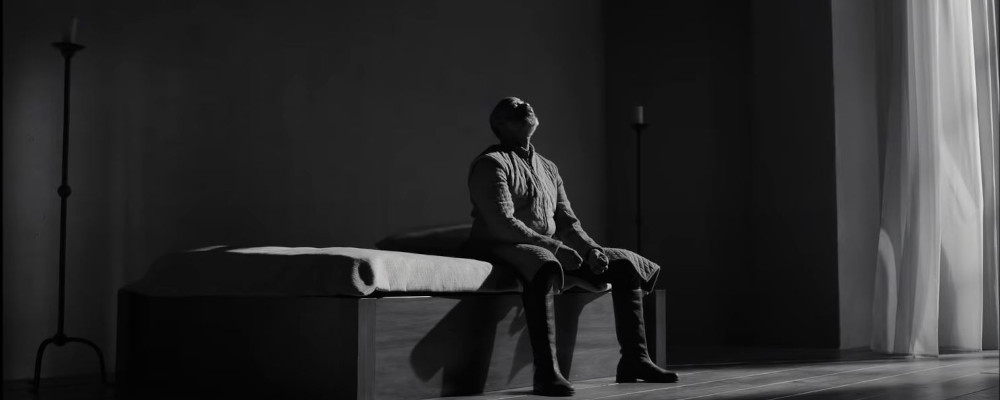Joel Coen (director)
Denzel Washington, Frances McDormand (starring)
There is an old theatre legend that says that every great actor who has played Hamlet has seen the role performed by the great actor of the generation before him, in an unbroken lineage back to Burbage’s original performance at the Globe. It is a romantic fancy, but even if it were true, film made it obsolete more than a century ago. Every actor and director—and, more importantly, every audience member—has access to every previous filmed version of a play, which means that, more than a new staging, a new Shakespeare movie arrives freighted with the burden of comparison.
Three movies of Macbeth overshadow all others. The first is Orson Welles’s 1948 moody and experimental film, which was shot in three weeks with no money on half-built sets in borrowed costumes (check out that crown!). The young star chopped and swapped lines and scenes with reckless assurance, but unlike his later composite and shoestring film of the Henriad, Chimes at Midnight, which is the best Shakespeare on film, his Macbeth is an impressive failure. The second is Akira Kurosawa’s 1957 Throne of Blood, an epic Japanese adaptation that captures the play’s power without its poetry. And, finally, there’s the blood-and-rain-soaked realism of Roman Polanski’s 1971 movie, which shot Ken Tynan’s more faithful script on location in Scotland.
The two most recent movie Macbeths respond to this inheritance very differently. The star of Justin Kurzel’s 2015 movie was not Michael Fassbender or Marion Cotillard, though he was good and she was great, but the moody landscape. Payne’s grey seas, umber hills, and steely skies overwhelm the characters, driving home their helplessness in the grip of natural and supernatural forces that are quite literally bigger than their earthly ambitions.
In his new movie, The Tragedy of Macbeth, Joel Coen has gone the other way, shooting in black and white almost entirely on sterile sound stages of stylized arches and long shadows, Bergman by way of de Chirico. The result is a claustrophobic drama of close-ups and set pieces in empty rooms. There are no pitched battles in this Macbeth and the climactic hand-to-hand combat takes place on narrow fog-shrouded battlements. The overall effect is of Coen working with Welles’s budget, but—with one exception, which I will come to—none of his genius.
My main complaint about Kurzel’s film was its unrelenting fatalism. There is never any hope for Fassbender’s Macbeth and the director sheds little light, literal or figural, on the reason for his downfall. It is no surprise that Kurzel’s bleak vision cut the character of the Porter entirely, eliminating the play’s only scene of comic relief. Coen, by contrast, keeps the scene but plays it in such a rush (Stephen Root’s Porter is literally backpedaling for most of his heavily-pruned speech) that it feels like an outtake. I single out this minor scene because, in each case, its mishandling is typical of the film’s misunderstanding of the play.
Over and over Kurzel and Coen make the mistake of thinking they can, or need to, improve on the material Shakespeare gives us. I don’t mean that every production must play the entire text verbatim or rigidly in order. Even though Macbeth is, by some measure, the shortest of Shakespeare’s scripts, keeping a movie under two hours requires cuts. It was also written for a spare stage and a small cast, so a movie director taking advantage of his medium should take liberties with the structure. But that does not excuse the comprehensive tinkering in both Kurzel’s and, especially, Coen’s mongrel scripts.
Why, for example, do both directors mix and match the witches’ spells? Leaving out the interpolations of act 3, which are probably not part of the original play, is fine, and Coen’s addition of some lines from Thomas Middleton’s The Witch is justified by the original text, but why edit the witches’ original appearance or the conjured visions when Macbeth returns to them for further prophecy in act 4? Those incantations are perfect as written: stop re-arranging them! At least what is left after Coen has mutilated the text is spoken well by Kathryn Hunter, whose mesmerising three-in-one witch is by far the best part of the movie—appropriately otherworldly and legitimately scary.
More inventively, and more superfluously, Coen adds a subplot by turning the minor character of Ross into an Iago figure. Ross enigmatically inserts himself into the murder of Banquo and the massacre of Macduff’s household, assumes protection of Fleance, and in the last scene substitutes for Macduff as the herald of Macbeth’s death. Creative interpretations of the plays are welcome, when the text can bear them. But here, Coen has to mangle the text (Lennox’s speech in act 3, scene 6, is chopped up to make a dialogue with Ross) in order to create a character who confounds the very point of the play.
The drama of Macbeth is in the ambiguous relationship of fate and will. Is Macbeth doomed from the moment the witches prophesy his future? Or is he still master of his actions? And, if so, will the prophecy unfold without his action? (“If chance will have me king, why, chance may crown me / Without my stir”) Making Ross a manipulative agent of the action meddles with the interplay of fate and will. It is a crude and superfluous addition. When Welles invented the character of a Holy Father for his movie, the introduction of a Christian counterpoint to the wyrd sisters was unnecessary but provocative. Coen’s Ross, though well-acted by a sinuous Alex Hassell, is just unnecessary.
It is not the only frustrating directorial choice. Throughout the movie, Coen seems obsessed with isolating his actors, denying them the opportunity to play off each other or in crowds. We are rarely treated to more than two characters interacting in the same scene. The main characters are constantly being pulled out of the action and away from each other. As a result, where the text calls for sprawling scenes or tense dialogue, we get sparse soliloquies and disembodied close-ups.
The worst example of this is Macbeth’s encounter with Banquo’s ghost. In the text and in every other production you will remember, this is an actor’s dream, calling for virtuosic acting to show the effects of extreme guilt on a sleepless conscience. The scene is plotted as an intricate psychological dance between Macbeth, Lady Macbeth, and the feasting nobles, each of which sees something different and reacts accordingly. Some directors choose to show Banquo and his “gory locks” to the audience; others give us the same perspective as the nobles who watch Macbeth react with horror to empty space. It can be played effectively either way (Polanski shows the ghost, Kurosawa doesn’t). But Coen makes the only inexcusable choice, which is to remove the scene from the banquet hall altogether. He has Washington play much of the scene (again with an unnecessarily hacked and rearranged text) in an empty room with his back to the audience. It’s a double act of dramatic theft. He steals the scene from Washington and robs us, the audience, of the full potential of his performance.
What else are we denied? A battle, for one. Any battle. And a sense of who the secondary characters are. Malcolm’s testing of Macduff is cut, as is the entire role of Donalbain, so we have no sense of who the English invaders are or why the audience, or the Scottish people, should prefer them to Macbeth. Brendan Gleeson is also wasted as Duncan, a cipher behind a Santa Claus beard, so there is no weight to Macbeth’s betrayal (this is something Kurzel got right, treating us to an extra-textual feast so we could see first-hand the hearty collegiality of David Thewlis’s benignant king).
We don’t really even get a marriage, which says a lot in a production of Macbeth. There are as many ways to interpret the relationship between Macbeth and Lady Macbeth as there are actors or directors, but Coen doesn’t seem particularly interested in it. Again, this is something Kurzel did well. He gave us a young couple grieving the recent death of a child, and Cotillard as a Lady Macbeth on the brink of madness even before Duncan’s murder. In Coen’s movie, we have no idea who the aging couple was before the play begins or what drives them so quickly to murder and treason.
That is the most important question left unasked and unanswered, but there are others. Why does Lady Macbeth suddenly go mad? Why does Macbeth? And what is the relationship between death and sleep (a theme hammered repeatedly in this text and throughout Shakespeare’s plays, but here unexplored)? Coen seems to think that ominous architecture can substitute for human horror. But a shadow weighs more heavily on the mind than on a floor, and to show that you need to give your actors more opportunities to interact and explain themselves to each other and to the audience. This, of course, is what Shakespeare gives us, but not Coen.
Coen’s uninterest in the central relationship is especially unfortunate because Denzel Washington and Frances McDormand are, despite everything, quite good; in the hand of a director who cared more about character, they might have been great. As it is, their performances mostly blend into the bland sets. Each has flashes of passion, but then falls quickly back into somnolent introspection. It is infuriating: I kept talking to the screen: let them act! Even “Tomorrow, and Tomorrow, and Tomorrow” falls flat, which is an astonishing achievement for a director handed a great actor and one of the most dramatic short texts in the language.
The witches’ vision admonishes Macbeth to be “bloody, bold, and resolute,” so why do we get a king who is bloodless, placid, and quiescent in the face of fate? The Macbeth of act 5 calls for the Denzel Washington of Training Day. “Why should I play the Roman fool and die / On mine own sword? Whiles I see lives, the gashes / Do better upon them” demands the volcanic delivery of “King Kong ain’t got nothing on me!” You can just see it, can’t you! Well, not here you can’t. It makes sense that Coen cuts that line, as he also cuts “They have tied me to a stake. I cannot fly, / But bear-like, I must fight the course.” I have seen a lot of Macbeths, from what in my mind will always be “the sitcom Macbeth” (on Broadway, starring Kelsey Grammar, Michael Gross, and Ty Burrell) to Sean Bean’s rugged cateran and Patrick Stewart’s more actorly thane. There is no reason Washington shouldn’t rank among the best, except one: Joel Coen.
There is no fight in this Macbeth. Washington’s age serves him well at times, particularly in the depressive moments of his late manic-depressive sleep-deprived paranoia (“I have lived long enough: my way of life / Is fall’n into the sere, the yellow leaf”). When he slumps on his throne, abandoned and awaiting fate, he looks tired and paunchy amid the swirling leaves, blown through the open window from advancing Birnam Wood as the throne room dissolves into a forested snow globe. It is the movie’s most inspired visual effect, but by then there is nothing left to care about. The plot has been aborted, and we are given no reason to root for either Macbeth or Malcolm in the battle that never really comes.
When Washington’s Macbeth does finally confront Macduff, he is already defeated. The revelation of the witches’ perfidy, one of the great “aw, shit!” moments in literature, comes as a flaccid anticlimax. I would have loved to have seen Washington process his oracular betrayal, even in a Coen close-up. Apparently Coen wouldn’t. The realisation barely registers. There is no heroism in Macbeth’s final, futile battle, no last noble defiance of fate and will, revealed here as mockingly united against him. Washington’s Macbeth speaks his last words: “Lay on Macduff” with all the emotion of someone asking to pass the salt.
If this review sounds bitter, it is because squandering riches is a moral crime. Coen has betrayed a great text, wasted great actors, and did not even manage to make (what is a great achievement in itself) a Coen brothers movie. There was a time when audiences rioted at disfavoured productions of Macbeth. In 1849, American audiences roared to home-grown Edwin Forrest, who was said to play the role as “the ferocious chief of a barbarous tribe,” and hissed at the Englishman William Charles Macready’s more “cerebral” performance. More than 30 people were killed and more than 100 injured in the Astor Place riots that ensued.
I am not saying that turning Washington, who could have been a Forrest, into a passionless Macready should provoke quite that reaction, but it would be hard not to sympathize if it did. (And, while I’m fantasizing, it would be nice to live in a world where Shakespeare still mattered enough to spark a riot). Coen’s movie fails in ways that show he didn’t learn the lessons of Welles’s experiment, Kurosawa’s vision, or Polanski’s bloody mess. It is not even as memorable as Kurzel’s beautiful and brooding vision. If it has a redeeming quality, it is second-hand: the failure inevitably sends us back to the text for consolation. It reminds us that Macbeth, the movie, may disappoint, but thank goodness we have always got the play.
Recommended for You

‘A celebration of the spirit of Alberta’: Ryan Hastman on the political, economic, and cultural importance of the Calgary Stampede

Stephen Staley: Squid Game was a warning to itself

Ginny Roth: How vacant liberal nationalism left Canada worse off than George Grant even imagined

Matthew Grills: Joey Chestnut is America




